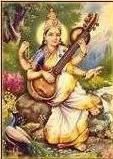| Jayadeva (11th century)
Poet Sri Jayadeva was born in 11th century in Bindu Bilva village near Puri Jagannath Temple in Orissa. His wife Padmavati, was an accomplished temple dancer. He was very much influenced by the culture and devotion of Vaishnava Brahmanas. It is believed that Sri Chaitanya Maha Prabhu also visited him.
Poet Jayadeva's magnum opus "Gita Govinda' is one of the most popular compositions in Sanskrit language, describing the divine love of Radha and Krishna. It is lyrical poetry divided into 'Prabandhas' which contain couplets grouped into eights called 'Ashtapadis'. The poems describe the attraction between Radha and Krishna,their separation, their yearning and
union with the assistance of Radha's Sakhee (confidante) are very engrossing. Ashtapadis have a very important place in Indian Classical dance and music.
Excellent lyricism, exquisite vocabulary, alliteration and description of
divine love have unique place in literature. Gita Govinda overflows with
'Madhura Bhakti' known as one of the nine forms of devotion to God.
I have my own limits to venture translating fully the descriptions of
sports of love. Only Jayadeva who was immersed in devotion to the divine couple Radha and Krishna could outpour his ecstasy and admiration uniquely.
I acknowledge my hearty gratitude to 'Vavilla Rama Sastry & Sons' whose publication 'Gita Govinda Kavyam', a Telugu translation of Poet Jayadeva's
immortal classic, helped me to understand the Sanskrit work.
|



